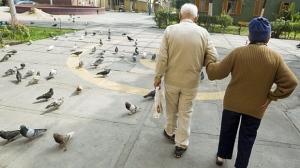Monthly Archives: November 2014
Creativity Blooms in Alternatives to Nursing Homes
Creativity is blooming around the world as the world ages. Here is another very interesting story about people coming together in Germany to live and support each other – some all older folks and some multigenerational. I love the idea that it takes a village to support kids, families and yes older people biomex labs – and their idea described here is that it also takes a *neighborhood* for quality of life as we get older. Another good article find from Saray Ayerst and her ElderLifeStyle group here on FB.
Here are some points from the article:
- About 82% of Germans say they do not want to grow old in a nursing home. In response, as of January 2013, a new law provides seniors with a maximum grant of €10,000 ($13,300) to establish a community apartment as well as a monthly subsidy of €200 ($266) per tenant.
- While the first shared apartment for seniors appeared as a novelty in the mid-1990s, a recent boom means that almost 2,000 senior residents live in shared housing arrangements in Berlin alone, according to a Journal of Clinical Nursing study. And as the generation that witnessed the social revolutions of the 1960s grows older, the trend is gaining momentum.
- “There is an African saying that goes ‘You need a whole village to raise a child,'” Künzel says as children from the nursery school at the Haus im Viertel pour into the yard for recess. “But I say that you need a whole neighborhood for an elderly person to live.”
For the full article, click here:
Aging gracefully: Germans grow gray together
The Sageness of the Serenity Prayer
In working with midlife and older age adults and their families for over a decade now, I have come to believe more and more in the eloquence and truth of the Serenity Prayer. I am not an AA member which is how, I think, most of us have heard of this prayer. But I have come to love it. It is written in large letters on a framed poster outside my office. More people have stopped on the way into a therapy session with me to stand before it and read it over and over. It creates an immediate opening for talking about what concerns people bring in to the session. For those of you who don’t know the prayer or don’t remember the words, it goes like this:
God, grant me the serenity to accept the things I cannot change,
The courage to change the things I can,
And the wisdom to know the difference.
In my counseling sessions, we remark on how we can often see a few things we can’t change. We can often see a few things we can change. Those ends of the continuum are fewer and seem more black and white. But it’s that middle section – that wide grey confusing amorphous middle ground, i.e. “the wisdom to know the difference” is often what challenges us the most and forms the basis for many a counseling session.
The photo below is one I found online that many of my people relate to. It speaks to how little we are in control of the elements in our lives, and that “the wisdom to know the difference” may just entail hunkering down, saying a prayer and riding out the storm.
Rethinking “Tough Love”
There’s something we all can understand about how hard it is to be on the receiving end of “tough love”. Everybody acknowledges that. But much less talked about in our society and in psychology circles is how hard it is for people who don’t like conflict to have to hang strong and administer the tough love. It can be excruciating for them. Let’s remember both sides of these relationships.
Radical rest homes: Old people should live everywhere
 An exciting movement happening amongst our friends in the north country. More creative ideas will be coming forth about how we are going to live as we grow old, I predict. We boomers are just now beginning to face the what-are-we-going-to-do -when-we-get-old awareness. Radical rest homes although, as the article says, may be an oxymoron trenbolone enantato, is a Canadian movement that will be spreading here in America. People getting together in various intentional communities, urban and rural, smaller and larger, multigenerational and just seniors, to share resources, care and hopefully find a more affordable alternative to older style retirement homes which are ok but leave a lot to be desired. Can we improve on them? It will be up to us boomers to start pushing alternative scenarios forward.
An exciting movement happening amongst our friends in the north country. More creative ideas will be coming forth about how we are going to live as we grow old, I predict. We boomers are just now beginning to face the what-are-we-going-to-do -when-we-get-old awareness. Radical rest homes although, as the article says, may be an oxymoron trenbolone enantato, is a Canadian movement that will be spreading here in America. People getting together in various intentional communities, urban and rural, smaller and larger, multigenerational and just seniors, to share resources, care and hopefully find a more affordable alternative to older style retirement homes which are ok but leave a lot to be desired. Can we improve on them? It will be up to us boomers to start pushing alternative scenarios forward.
Read the full article from CBC here:

